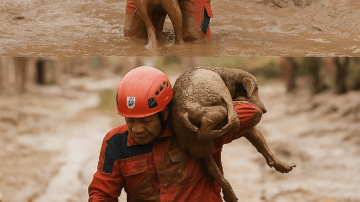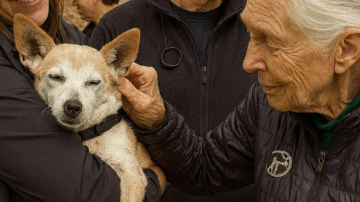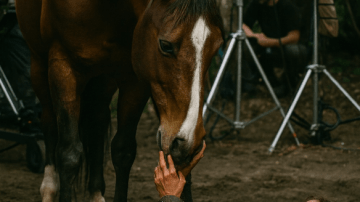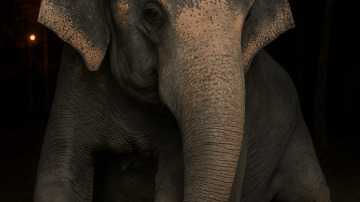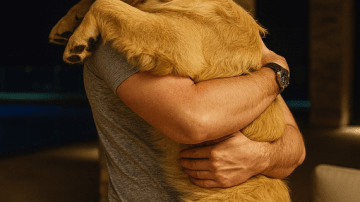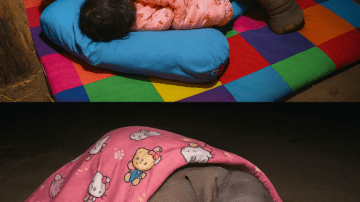On my way to work one ordinary morning, I noticed a small puppy sitting by the roadside. His tiny body seemed out of place against the rumbling traffic, and though I bent down to greet him, he ignored me completely. Something about him tugged at my heart, so I stepped closer to check on him.

He still had a leash around his neck, which meant he should have had an owner. Yet there he was, alone. He lifted his head for a moment, met my eyes, and then quietly lay back down. His eyes—so sad, so sorrowful—seemed far too heavy for a puppy so young.
The following evening, I passed by the same spot again. To my surprise and heartbreak, the puppy was still there. At that moment, I realized he might be lost or, worse, abandoned. His eyes still carried that same sadness, as if silently asking the world why he had been left behind.
I decided to post his picture and details in the neighborhood group chat, hoping someone would recognize him. Before long, a young lady arrived. She told me she would adopt him, to give him a safe home. Perhaps startled by her sudden presence, the puppy darted under a car and hid. After a long struggle, we finally managed to coax him out. He was barely forty days old. Because it was late at night, the vet only performed a preliminary check-up. Tests showed he had contracted coronavirus. The young lady didn’t hesitate. She brought him home that very night.

To everyone’s relief, he adapted quickly. Within hours, the once timid and pitiful pup was already wagging his tail, playing, even trying to climb out of his cage. His innocent eyes sparkled with curiosity, and for the first time, I saw joy flicker where there had only been sorrow.
The next morning, she took him back to the hospital for a full examination. By then, she had given him a name: Latte. It suited him perfectly—sweet, warm, comforting. When the doctor prepared his injections, Latte squirmed nervously, resisting at first, but with gentle comfort he calmed down. Still, when the doctor announced a second shot was needed, Latte seemed to understand and grew tense again.
In the middle of the examination, an amusing scene unfolded. While the doctor was writing his prescription, Latte suddenly pooped on the table. Instead of scolding him, the doctor simply said it was good—examining the stool would give insights into his health. Everyone laughed. For Latte, it was just another game.
At first, I had thought he was a shy little dog. But on that day, he showed us a playful, mischievous side. Maybe it was because, for the first time, he knew he was safe, loved, and wanted.

The vet noted that Latte’s eyes still seemed older than his age, as if he carried memories no puppy should. He had known sadness too soon. But now, love was rewriting his story.
At home, the young lady gave him medicine carefully, and to everyone’s surprise, he took it without complaint. As a first-time dog owner, she made mistakes at the start—feeding him dry kibble directly. But she quickly learned that puppies need kibble softened in goat’s milk. Latte thrived under her care, sleeping soundly after each meal.
Soon enough, his playful side grew stronger. He began rejecting medicine, wrinkling his nose at the taste. His cage could barely contain him anymore. She bought him toys, little outfits to keep him warm in the cold weather, and Latte—wrapped up in tiny clothes—looked cuter than ever.
A week later, I visited their home. I played a recording of a puppy’s bark on my phone, curious about his reaction. Latte immediately bristled. He grumbled and barked back, clearly upset. He seemed jealous, almost angry, as though he thought another puppy had come to steal his beloved owner’s affection. We couldn’t stop laughing, but behind his little tantrum was something beautiful: he truly cared about his new family.
Two weeks after his rescue, new tests showed Latte was free of coronavirus. The relief was immense. Watching him bounce around, energetic and playful, I could hardly remember the sad puppy I had first met on the roadside. If no one played with him, he would eagerly trot over, demanding attention.
Soon came another big step: his vaccinations. At the clinic, he grew nervous again. The moment the doctor produced the rectal thermometer, he dove into the young lady’s arms, seeking protection. But when it came time for the injection, he surprised us all by staying perfectly still. On the way home, he sat quietly in her bag, peeking out curiously at the world. He was learning that the world could be safe after all.

Back at home, Latte’s appetite flourished. He eagerly begged for a share of her meals, wagging his tail until she gave him a little rice, which he devoured happily. At night, he sometimes whimpered in his sleep, as if haunted by dreams of his lonely days on the street. But now, when he woke, there was always someone there to comfort him.
Three weeks passed. Latte had grown stronger, bigger, and smarter. He quickly learned tricks: sitting on command, offering his paw, spinning in circles, lying down on cue. Each new skill made him beam with pride—and made his owner laugh with joy.
Forty days after his rescue, Latte enjoyed his first real outing. The young lady brought him outside to meet people. To her surprise, strangers fell in love instantly. Children wanted to pet him, adults stopped to admire him. Latte, once abandoned and sorrowful, was now the center of attention, tail wagging furiously as though he knew he was finally where he belonged.
Looking back, it’s hard to believe he’s the same puppy who once sat silently by the roadside, eyes filled with sadness. Now, his eyes shine with warmth, trust, and happiness.
Latte’s story reminds us that sometimes, all it takes is one person willing to stop, to care, to give a chance. And with that chance, even the saddest eyes can learn to sparkle again.

